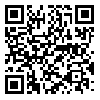Volume 38 - Continuously Updated- In press
IJN 2025, 38 - Continuously Updated- In press : 0-0 |
Back to browse issues page
Download citation:
BibTeX | RIS | EndNote | Medlars | ProCite | Reference Manager | RefWorks
Send citation to:



BibTeX | RIS | EndNote | Medlars | ProCite | Reference Manager | RefWorks
Send citation to:
Shamsi A, Ehteshami A, Zandi H, Namnabati M. Investigating the Effect of Telenursing Program on Maternal Breastfeeding Self-Efficacy, Infant Weight Gain and Rehospitalization in Premature Infants: A Quasi-Experimental Study. IJN 2025; 38 (S1 )
URL: http://ijn.iums.ac.ir/article-1-3832-en.html
URL: http://ijn.iums.ac.ir/article-1-3832-en.html
1- Nursing and Midwifery Care Research Center, Isfahan University of Medical Sciences, Isfahan, Iran. , noor13500@yahoo.com
2- Health Information Technology Research Center, Isfahan University of Medical Sciences, Isfahan, Iran
3- Department of Pediatrics, School of Medicine, Emam Hossein Hospital Research Center, Isfahan University of Medical Sciences, Isfahan, Iran
4- Nursing and Midwifery Care Research Center, Isfahan University of Medical Sciences, Isfahan, Iran
2- Health Information Technology Research Center, Isfahan University of Medical Sciences, Isfahan, Iran
3- Department of Pediatrics, School of Medicine, Emam Hossein Hospital Research Center, Isfahan University of Medical Sciences, Isfahan, Iran
4- Nursing and Midwifery Care Research Center, Isfahan University of Medical Sciences, Isfahan, Iran
Abstract: (267 Views)
Background and Objective: One of the common complications of premature birth is nutritional disorders in preterm infants. Telenursing is one strategy that provides a supportive framework for empowering mothers. This study aimed to determine the impact of telenursing on breastfeeding self-efficacy in mothers, weight gain, and the frequency of readmission in preterm infants in neonatal intensive care units (NICUs).
Methods: In this semi-experimental study based on convenience sampling, 60 mothers of discharged preterm infants from NICUs affiliated with Isfahan University of Medical Sciences (30 in each control and intervention group) were included in 2022. The intervention group received a telenursing program that included breastfeeding consultation, nutritional advice, and emotional support for eight weeks post-discharge, while the control group received the usual post-discharge follow-up program. After the study, variables such as weight gain, readmission, and maternal breastfeeding self-efficacy were assessed using the Dennis Breastfeeding Self-Efficacy Scale questionnaire. For statistical analysis, descriptive statistics were utilized alongside independent t-tests to compare the mean breastfeeding self-efficacy scores between the intervention and control groups.
Findings: Results from paired and independent t-tests indicated that the mean breastfeeding self-efficacy score differed significantly, with a mean score of 154.4 ± 4.3 in the intervention group compared to 124.8 ± 5.30 in the control group. In terms of weight gain, significant differences were reported before and after the intervention within each group (p < 0.05), but no significant difference in weight gain was observed between the two groups (p = 0.45). Additionally, the readmission rate in the control group was reported at 33.3%, while no readmissions were reported in the intervention group.
Conclusion: Implementing telenursing interventions focused on education, consultation, and addressing care challenges through internal messaging platforms can significantly enhance breastfeeding self-efficacy and reduce the need for readmission.
Methods: In this semi-experimental study based on convenience sampling, 60 mothers of discharged preterm infants from NICUs affiliated with Isfahan University of Medical Sciences (30 in each control and intervention group) were included in 2022. The intervention group received a telenursing program that included breastfeeding consultation, nutritional advice, and emotional support for eight weeks post-discharge, while the control group received the usual post-discharge follow-up program. After the study, variables such as weight gain, readmission, and maternal breastfeeding self-efficacy were assessed using the Dennis Breastfeeding Self-Efficacy Scale questionnaire. For statistical analysis, descriptive statistics were utilized alongside independent t-tests to compare the mean breastfeeding self-efficacy scores between the intervention and control groups.
Findings: Results from paired and independent t-tests indicated that the mean breastfeeding self-efficacy score differed significantly, with a mean score of 154.4 ± 4.3 in the intervention group compared to 124.8 ± 5.30 in the control group. In terms of weight gain, significant differences were reported before and after the intervention within each group (p < 0.05), but no significant difference in weight gain was observed between the two groups (p = 0.45). Additionally, the readmission rate in the control group was reported at 33.3%, while no readmissions were reported in the intervention group.
Conclusion: Implementing telenursing interventions focused on education, consultation, and addressing care challenges through internal messaging platforms can significantly enhance breastfeeding self-efficacy and reduce the need for readmission.
Keywords: Preterm infants, Tele-nursing, Breastfeeding, Self-efficacy, Weight gain, Re-hospitalization
Type of Study: Research |
Subject:
nursing
Received: 2024/08/9 | Accepted: 2025/03/21 | Published: 2025/03/21
Received: 2024/08/9 | Accepted: 2025/03/21 | Published: 2025/03/21
Send email to the article author
| Rights and permissions | |
 |
This work is licensed under a Creative Commons Attribution-NonCommercial 4.0 International License. |





